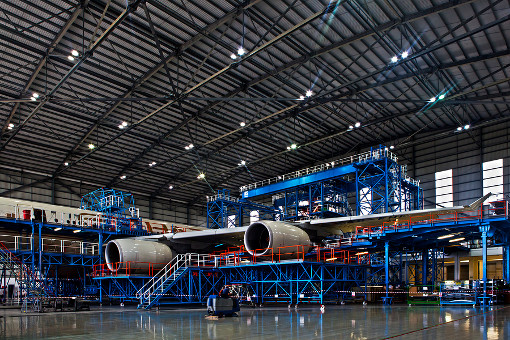Among the best pieces of advice I’ve heard in the past is to remember to use your eyes, ears and mind. If you’re entering or already working in the Aerospace or High-Tech Manufacturing field, you have proven you’re intelligent, inquisitive and willing to learn. Key to your success and enjoyment of this profession is YOUR commitment and discipline in learning essential procedures, replacing bad habits with good ones and challenging yourself every day.
Everything is common sense: attitude, alertness and the satisfaction of doing the job well — every time. Remember these points and you will find lasting pride and enjoyment in this profession.
Suggested Resources
Check out our articles on Controlling FOD In A Manufacturing Facility or How to Set Up a FOD Program for more information.

Keep Your House in Order to Prevent FOD
“Almost every FOD incident can be traced back to bad housekeeping.”
Since we have discovered that FOD is the ultimate saboteur, experts have recognized this truth. The solution: A place for everything, and everything in its place. This ancient truism takes on a new meaning in today’s aerospace or high-tech manufacturing environment.
The term ordered also relates to how we approach the task — learning and following procedures, refusing to do the job halfway and maintaining a positive attitude.
How to prevent FOD in aviation by keeping your house and equipment in good repair:
- A lug nut from your pickup can down an aircraft. A loose metal sign can break loose to find its way into a turbine. A hole in your pocket or tool pouch can allow a key or tool to drop on the deck and become a FOD threat.
- Worn-out ground support equipment, tools, ladders, etc. may leave a broken part behind, unnoticed until someone runs up an engine. Shavings from a loose fitting may interfere with a seal or connection, causing a plane to crash weeks, months or even years later.
- Watch your “stuff” — materials, packaging, etc.
- What evil person invented those pesky polystyrene pellets in packaging? All packing material, binding tapes and wires, string, pieces of cardboard, wood or plastic qualify as potential threats to your enjoyable day — or some person’s life. Again, housekeeping — pick it up immediately and put it in a secure container for disposal. Return tools to their assigned location immediately.
- Incidentally — watch delivery people who enter your “space”— they represent stranger danger. They don’t understand how important it is to not litter. They may leave something behind; watch them and inspect the area after they leave.
Pretend the Tool Lady/Man is coming to visit
A notification that “company” is coming motivates all of us to tidy up and put things away. Auditors, inspectors or other general company — they all get our attention.
Cleanliness reduces FODliness. Tool control is fundamental and can take many forms — foam cut-out tool shadow panels in toolboxes, formal checkout procedures, and electronic tracking. The best tool control is habit. Take only the tools you need and carry, count, and use them with the same routine; thoroughly check the work and tool storage areas when finished.

Parting is the key to avoiding “sweet sorrow.”
“How many #xx washers do we have in the shop? Where should I put this replacement fuel access door? What happened to those tabs? I wanted to install them this morning.”
Keeping track is a challenge.
The number of parts, pieces, connectors, caps, fasteners and whatever in a flightline operation is staggering and always changing. Parts Control, like Tool Control, is critical. Whatever method your operation has implemented to achieve this, learn it and love it. It will save you time and hassle.
Track it and tie it down!
Who hasn’t worked on a car, finished, and then turned the key to test the handiwork, only to discover a left-behind wrench has fallen off the block? Or worse – dropped into the fan with catastroFODic results?
It’s easy to forget that a quiet shop or flight line can turn into a dangerous place when a technician starts to run up an engine. Prop wash and jet blast or suction turn loose items into flying missiles — killer FOD.
Operate as if someone is about to hit the starter — keep tools, materials, clipboards and other items secure in their assigned places.
Pretend:
- Your favorite grandmother is coming to visit your work
- Your kids are on every plane that visits your area
- Lives and jobs depend on your diligence — because they DO!
Write it down and talk it up
A wise man said, “Every problem in the world is caused by poor communications.” Think about this statement. For our purposes, it’s a key to how to prevent FOD.
YOU are on the line. YOU are the eyes of the operation. YOU may notice a procedure that could be made more efficient and safer, machinery needing replacement or repair, insecure storage or disposal routines, inadequate screening of visitors… endless potential for improvement. YOUR challenge is to observe, to analyze, and to communicate with your supervisors to ensure that dangerous practices are eliminated and safer conditions are realized.
It has been common practice for budget-conscious outfits to “make do” with shared equipment such as sweepers. When it works, that’s fine. But critical areas are often left to chance, waiting for “our turn.” If you find that you don’t have enough of the right equipment, pass the word along. Non-communication may mean a crucial need is unnoticed until you have a tragic FOD incident.
When you see it — good, bad or eligible for improvement — write it down and pass it on up the chain of supervision.
Observe — Analyze — Communicate. This easy practice can stop FOD, protect your operation and customers and may lead to promotions and rewards for you.
Feel the team concept!
Give the teamwork speech! Whether you’re in military or civilian aerospace operations, the need for cooperation and communication is a fact of life.
Pilots depend on their crews to help keep their airplane in the sky. Simple — they trust. So do their passengers, fellow pilots and families back home.
With a few unfortunate exceptions, professionals learn to be trustworthy and believe they can trust their colleagues. That doesn’t mean it’s wrong or hostile to realize that all of us are human beings who make mistakes, and routinely verify that other workers are maintaining the level of performance demanded in this kind of endeavor. The saying, “Trust but verify” should have been invented for aviation operations.
Expect that your work will be observed, critiqued and verified every day. Team members support each other that way. Supervisors and colleagues are your team, and everyone will be watching everyone else to help keep the work flowing safely and efficiently. It’s in your interest to embrace this philosophy, but never depend on your teammates to cover your carelessness or tolerate sloppiness.
Do you remember the expression: “Observe — Analyze — Communicate”? When everyone feels and supports the Team concept, good things happen and work is significantly easier.
Things to remember to Prevent FOD:
- FOD hurts, costs and is 99% preventable
- Your attitude is the key factor
- Develop and trust instincts that tell you something is “out of place” in your area; investigate, correct and report when you find a problem
- Tested procedures for tool and part control, storage and disposal, inspection, and communication must be learned and habitually followed to stop FOD incidents and prevent recurrences
- Open, productive communication up and down the supervisory chain will increase safety and efficiency
- Practice of “Clean-As-You-Go” habits is the primary tool for your personal FOD Prevention Program
